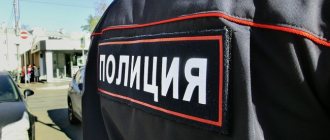Interrogation of a witness is the most basic and widespread category of participants in criminal proceedings. Interrogation is the most common and primary way of obtaining information and evidence, both for the prosecutor and the defense.
The status of a “witness” can only be obtained “by the will of fate” or... but that’s a completely different story. One becomes a witness regardless of his desire or status. But the legislator determined the circle of persons who cannot be questioned as a witness (Article 69 of the Code of Criminal Procedure).
When should you come for questioning? This issue remains relevant for all citizens who are faced with the investigation process. Many have never dealt with such situations, so they do not know what can and cannot be said when an investigator calls for questioning in a criminal case.
If a police investigator calls for questioning, then a criminal case has already been initiated. If an operative officer calls, it means that a criminal case has not yet been opened (the statement about the crime committed is being verified). Regardless of these details, you will need to appear on a summons. The legislator has provided it in different forms - written or electronic invitation. You need to come at the specified time and preferably with your lawyer.
What is interrogation in criminal proceedings
Interrogation is usually considered an investigative event, as a result of which the investigator receives from the interrogated the necessary details of what happened, what he witnessed and what he witnessed. In general, you should know that the role of the interrogated person can be: a victim, a suspect or an eyewitness (of the whole or part of the incident).
Expert opinion
Anton Dolgov
Lawyer, member of the Disciplinary Chamber of the Mykolaiv Region Bar Association
“Require the investigator to provide documentary evidence of the invitation to interrogation. There are several methods: a summons delivered in person or by mail.”
According to the Code of Criminal Procedure, the summons contains the following information:
- who exactly and in what capacity is summoned for questioning;
- who should you come to for questioning and at what address;
- day and time of appearance;
- possible consequences in case of failure to appear without a valid reason.
Before the start of an investigative activity, the investigator is obliged to tell the interrogated person about the consequences of knowingly giving false testimony. What he warns him about under his signature about criminal liability.
You might be interested in:
Criminal law
Exemption from criminal liability under Article 286 of the Criminal Code in connection with reconciliation
Read more
Criminal law
Reckless public statements by state representatives about a person’s guilt during the investigation stage violate the principle of the presumption of innocence and affect the impartiality of the court
Read more
Criminal law
How should interrogation of minors be conducted?
Read more
Criminal law
Presentation of a person for identification
Read more
Criminal law
Complicity in crime
Read more
Criminal law
Detention
Read more
According to Art. 84, 85, 170 of the Code of Criminal Procedure of Ukraine, the investigator has every right to organize an interrogation, regardless of time or place. The main thing is to comply with two basic conditions:
- The presence of an open criminal case.
- Maintaining an interrogation record in accordance with the Code of Criminal Procedure.
Otherwise, we are not talking about free interrogation, but about forced interrogation. Therefore, such a person has every right to refuse to give answers to the questions posed (according to Article 63 of the Constitution).
At what stages is the interrogation carried out?
The interrogation is carried out at four main stages:
- Preliminary . At the first stage, the investigator gets acquainted in detail with the personality of the interrogated person, fills out the respondent’s questionnaire in the protocol, and tells the rules and conditions of this investigative activity. As a result, the investigator must talk about the rights and responsibilities of the person and assess his degree of responsibility in a particular case. At this stage, it would be correct to establish psychological contact with the interrogated person and get acquainted with his biography.
- The second stage is the narration of the interrogated person (free story). A witness, accused or victim, is called to testify and tells everything that concerns the criminal case. At the same time, the investigator should not interrupt the narrator, unless the latter has deviated from the main topic. As a rule, at this stage the investigator can learn many new facts that he was not previously aware of.
- Question and answer stage . Taking into account the information received, the investigator decides what question to ask the citizen to clarify certain facts. Questions should not contain hidden answers, leading answers and be extremely clear and transparent. And the answers should be given extremely accurately or, conversely, depending on the goal you are pursuing.
- Final stage . The interrogation procedure itself can be “main” (the primary interrogation protocol) and “additional” - protocols for additional interrogation of a person. It happens that before the start of legal proceedings, the investigator may call a suspect, witness or victim for questioning for the last time to obtain clarification of facts and eliminate contradictions in the case.
Tactical techniques of the investigator during interrogation
Established psychological contact with the person being interrogated is the most important component of an informative interrogation for an investigator. In order to properly build a relationship with the person being interrogated and obtain the necessary data, he chooses conversation tactics and tactics.
Interrogation tactics are the model of behavior of the investigator, chosen by him after studying information about the person being interrogated at the preparatory stage. The tactics and techniques used are not prescribed by law. However, they must meet the following requirements:
- do not violate the rules of law and morality;
- do not put pressure on the person giving evidence;
- not be based on violence, threats, torture;
- do not rely on unrealistic promises;
- not to discredit the activities of law enforcement agencies.
During interrogation, various groups of tactical techniques are used. Techniques that motivate testimony include clarifying questions, retelling the event that happened, clarifying the details of the situation, using associative connections to recall the details of what happened, and clarifying the psycho-emotional state of the interrogated at the moment of perception.
If the interrogated person takes a negative position in relation to the investigation, the investigator tries to create in him the impression that opposition is pointless, neutralize aggressive behavior by creating a strict environment, takes advantage of the interrogated person’s uncertainty, unexpectedly presents eloquent evidence and monitors the reaction, calls for the fulfillment of civic duty, appeals to conscience, honor of the person being interrogated.
If the interrogated person has a benevolent attitude towards the investigation, a trusting environment is created during the interrogation; the investigator provides assistance to the person giving evidence in recalling the facts and asks clarifying questions.
In acute, conflict situations, an authorized person resorts to the following techniques: ensuring a business-like working environment, creating the impression that the investigator is fully aware of the circumstances of the case, convincing the person giving evidence that it is pointless to try to hide the facts known to him.
Who can conduct the interrogation
Most often, people meet with a police investigator during interrogation. Sometimes a NABU detective or an SBU employee may be called in for questioning, or less often an operational worker.
The article of the Code of Criminal Procedure states that in his proceedings the investigator must be personally present and organize the interrogation of citizens. It is not allowed to delegate interrogation to operatives. It is also possible that the investigator would issue a resolution to conduct a separate procedural action in another territory, in which case the investigator who did not investigate this case has the right to interview you or confiscate something.
An exception to the rules are situations when detectives from other areas of the city were involved in the case. They may also be present during the interrogation, provided that there is a separately issued order from the main investigator. The submitted document must be submitted exclusively in writing. If you were interrogated by other employees who do not have the right to do so, the interrogated person may refuse to carry out this event and be the last to report official violation.
How the interrogation takes place: general rules and procedure
A citizen who has received a summons with a request to appear for questioning must come exactly at the specified time and day. If this request is ignored, appropriate measures will be taken.
Rules for interrogation:
- Before the start of this event, the investigator talks about the rights of the interrogated person and asks in what language it will be convenient for him to answer questions. Although this does not entirely correspond with the principle of a “single state language” and the rule of legal proceedings, which states that all documents must be drawn up only in Ukrainian.
- Interrogation tactics can be any, with the exception of the use of leading questions. Tactics, conditionally, can be divided into two types - “question-answer” or “narration, and then questions.”
- The person being interrogated has every right to record everything that happens using audio and video communications. But first, he must warn about this, and the person being interrogated can refuse such interrogation.
- After the end of the interrogation, all listed video or audio materials received are sealed and added to the case file.
- The witness should not warn the investigator about the presence of a lawyer during the interrogation. In this case, the lawyer enters the office together with the witness being questioned. The constitutional right of everyone, without exception, is to have the right to defense and legal assistance.
Upon completion of the event, the lawyer can note the identification of violations that were committed by the investigator. All violations must be recorded in the protocol. No one can limit this right to you.
Confrontation and its differences from interrogation
Confrontation is the simultaneous interrogation of two persons who gave contradictory testimony. Contradictions in testimony arise as a result of honest misconception or deliberate misrepresentation of facts. The decision to conduct a confrontation is made by the investigator. The confrontation is carried out after the investigator has issued a resolution.
The main reason for its holding is the presence of contradictions in the essential circumstances of the case. Facts about the place and time of the commission of the crime, the guilt of the accused and the method of committing the crime are considered significant.
The tactics of interrogation and confrontation are different. Interrogation as an investigative action implies psychological interaction between the investigator and the person giving evidence, and excludes the presence of persons distracting the interrogated person from giving evidence.
The confrontation takes place after the initial interrogation. During the confrontation, the investigator asks the persons between whom it is being conducted whether they know each other and what kind of relationship they have. Those interrogated take turns giving evidence on the controversial circumstances of the case. After giving testimony, the investigator asks questions, if necessary. Persons between whom confrontations are being conducted may ask each other questions, with the permission of the investigator. (Article 192 of the Code of Criminal Procedure of the Russian Federation).
Rights and obligations of participants
A citizen who has been summoned for questioning must know his rights and confidently use them. Interrogation is prohibited at night, except in situations that require urgent resolution.
Important! In the usual approach, all procedural actions (interrogation or search) can be carried out only until 22:00. But according to the law, interrogation can be carried out at night - from 22:00 to 6:00. In this case, the interrogation should not last more than 4 hours without a break. But such interrogation must be motivated by extreme necessity.
Rights of the person being interrogated:
- A person may familiarize himself with the contents of the protocol upon completion of the investigative measure.
- If video filming or sound recording was used, the citizen must be aware of the reason for using such recording means. Upon completion of the investigation, the interrogated person can review the video or listen to the recording.
- A person may disagree with the information specified in the protocol and demand changes “to what is recorded in his own words.”
Information data cannot be used as evidence if the interrogated person cannot indicate the source of the information received.
Tips for the investigator
On the topic “interrogation of a witness under the Code of Criminal Procedure,” many write dissertations, which can be found on various forms. During the interrogation of a witness, the investigator must comply with the Code of Criminal Procedure of the Russian Federation. If the witness adheres to a nocturnal lifestyle, it is better to conduct the interrogation of the eyewitness in the evening, this will ensure that he will feel more comfortable and it will be easier to find psychological contact.
The order in which you are summoned for questioning must be chosen wisely. The more data the investigator already has, the more information he already possesses, the easier it will be to interrogate witnesses who are reluctant to testify.
The meanings of blaming and suspecting are different. If there is not enough evidence, charges cannot be brought.
During the initial interrogation of the defendant:
- he must not be interrupted;
- You cannot contradict him or make it clear that the investigation knows other details of the case.
- you need to gain trust;
- at the end of the free story, you can proceed to cross-examination if the person being interrogated gave the impression of an honest person;
- if there are suspicions that he is lying, it is better to finish the first interrogation at the stage of the story.
And during re-interrogation, be guided by facts that will force the accused to tell the truth. You can arrange a confrontation, present the available evidence in the case, for example, a DNA sample.
Presence of a lawyer
According to Ukrainian legislation, every witness, victim or accused has the opportunity to use the services of a lawyer during interrogation. The presence of a lawyer at this event makes it possible to discipline the investigator, forcing him not to neglect his official position. Do not put pressure on you and ensure that your rights are respected.
During the interrogation, the lawyer will fully control what is happening and ensure that the procedure is carried out in accordance with the laws.
Expert opinion
Anton Dolgov
Lawyer, member of the Disciplinary Chamber of the Mykolaiv Region Bar Association
“Sometimes the investigator may deliberately “intimidate” you, pointing out that the presence of a lawyer indicates guilt and his involvement in the crime. The investigator may indicate that the person is hiding some information. But these are just cunning tricks that you don’t need to pay attention to. It is necessary to remind the police officer that the legislation of Ukraine reserves the right of the witness to use the services of a lawyer. However, the investigator may not allow the lawyer to interrogate for fictitious reasons. In this case, the interrogated person has the right to refuse to carry out this procedure, citing infringement of his own rights, which should be indicated in writing in the interrogation protocol.”
If your rights were violated during interrogation
If your rights were violated during interrogation, this can be a serious advantage for you in future legal proceedings. Reflect violations in the actions of the investigator in your comments, which are attached to the protocol.
If the authorized person violated the interrogation procedure, the testimony obtained during this investigative action will be considered invalid. If you were threatened, make an appropriate note about this in the interrogation record. You also have the right to write a statement to the prosecutor's office or contact the appropriate department of the department that is dealing with the case.
How to behave during interrogation in a criminal case: advice from a lawyer
The initiation of a criminal case can occur “in fact” or “in relation” to a specific person. The citizen, whose name and surname will be indicated in the resolution, receives a new status - suspect. This means that we are talking about procedural rights that must be used.
Important! There are situations when the investigator threatens the suspect: either you admit guilt or go to prison. This is a common method of psychological violence. The investigator does not have the right to “threaten” or “warn”. Otherwise, the latter can indicate data about threats in the protocol. It is always recommended to carefully re-read the protocol, because the person being interrogated (according to the Code of Criminal Procedure) has the right to independently make amendments to the protocol. Moreover, operational officers can conduct a dialogue with a citizen without a protocol. Therefore, in the event of threats from operational officers, it is important to require the completion of a protocol, which the prosecutor can review or send a copy to the DBI.
Expert opinion
Anton Dolgov
Lawyer, member of the Disciplinary Chamber of the Mykolaiv Region Bar Association
“One of the main tasks of the interrogated person is to find out his own status, since your rights will depend on this. You can directly ask the investigator what your status is - suspect, witness or person providing explanations. The difference will be cardinal: the witness is required to give real testimony, but the accused may refuse to testify. Moreover, the suspect or accused may refuse to answer a specific question or refuse interrogation altogether. Such behavior should not be regarded as evidence of a citizen’s guilt. But a biased attitude on the part of the pre-trial investigation will be ensured!”
As for the witness, according to the Constitution of Ukraine, he may refuse to provide information that concerns him personally or close relatives (husband, wife, children, parents).
Regardless of the status received, a citizen is not required to prove his innocence. Even the suspect is considered innocent of the incident until the court makes an appropriate verdict. If during the trial or investigation some doubts were identified that cannot be clarified, they should be interpreted in favor of the accused.
FPA recommendations when calling a lawyer for questioning
Recommendations on the actions of a lawyer in the event of a call for questioning as a witness at the initiative of the prosecution and the court on issues related to participation in criminal proceedings “Approved” by the Decision of the Council of the AP SK on February 21, 2022 1. General Provisions 1.1. Questioning of a lawyer as a witness on the initiative and in the interests of the principal.In criminal proceedings, testimony is allowed by a lawyer in accordance with the exceptions established by paragraph 2 of Part 3 of Art. 56 of the Code of Criminal Procedure of the Russian Federation (taking into account the legal position expressed in the Determination of the Constitutional Court of the Russian Federation of March 6, 2003 No. 108-O), i.e. at the request of a lawyer and in the interests of the principal. A similar exception (due to the circumstances of the lawyer providing legal assistance other than participation as a defense attorney in criminal proceedings) is provided for in paragraph 3 of Part 3 of Art. 56 Code of Criminal Procedure of the Russian Federation. Calling a lawyer for questioning in this case is an initiative of the defense, meets its interests, is voluntary and consensual, including regarding the volume of confidential information to be disclosed. Due to the de facto absence of a risk of violation of attorney-client privilege, there is no need for detailed regulation of the actions of a lawyer who is subject to questioning at the initiative of the defense. Also, in this case, there is no need to insist on a judicial procedure for obtaining permission to interrogate a lawyer at the pre-trial stage, since the subject of the attorney-client privilege (principal) not only gave consent, but is also interested in bringing certain information to the investigative body.
A similar position is shared by the European Court, which has repeatedly considered the possibility of interrogating a lawyer on the initiative and in the interests of the client in terms of the fairness of the trial.
The possibility of questioning a lawyer to confirm the client’s statement, for example, regarding the torture used against him, follows from the ECHR Ruling in the case “Dmitrachkov v. Russian Federation” dated September 16, 2010. In another decision (ECtHR Ruling of June 12, 2012 “Gryaznov v. Russian Federation”) regarding the possibility of questioning a lawyer to confirm the plaintiff’s statement of ill-treatment (in civil proceedings on a claim for compensation by the state for damage caused during criminal prosecution), the European Court noted that the rule The attorney-client privilege serves the important purpose of maintaining confidentiality in the attorney-client relationship and promoting full candor with the attorney to enable the attorney to best provide legal assistance and effective representation. This privilege serves the interests of the client and, therefore, can only be claimed by the client, who can waive it. When summoned for questioning on the initiative or with the approval of the principal, the specific conditions for the lawyer to give evidence, including the scope of disclosure of confidential information, are regulated quite clearly and do not require additional clarification. 1.2. Questioning of a lawyer as a witness at the initiative of the court or the prosecution. The actions of a lawyer in the event of a call for questioning at the request of the prosecution or on the initiative of the court (which, as a rule, occurs against the will of the client) require detailed regulation in order to avoid cases of unjustified disclosure of attorney-client privilege, obstruction of lawyer's activities, violation of the legal rights and interests of a person to be protected by chosen lawyer. Appeals from lawyers to the Bar Association for clarification are associated with precisely such situations. At the moment, there are two exceptional cases of calling a lawyer to testify against his client at the request of the prosecutor (decision of the investigator) or on the initiative of the court about circumstances arising from the professional activity of the lawyer. According to the decisions of the Constitutional Court of the Russian Federation (Definitions of July 16, 2009 No. 970-О-О and of March 29, 2016 No. 689-О, also taking into account the Determination of June 6, 2016 No. 1232-О) these cases are an exception from the general rule prohibiting interrogation of a lawyer about the circumstances of the provision of legal assistance, since they are outside the scope of values protected by attorney-client privilege. In contrast to testifying at the request of the defense, expected by the initiator of the summons for questioning, the testimony of a lawyer, as a rule, does not correspond to the interests of the principal. The lifting by the Constitutional Court of the Russian Federation in these exceptional cases of witness immunity in terms of the opportunity to ask relevant questions to a lawyer does not in itself mean the lawyer’s unconditional obligation to answer them. At the same time, in the event that a person brought to criminal liability consistently admits guilt in the incriminated acts, the testimony of a lawyer to the permissible extent and with the consent of this person (and his defense attorney) correlates with his position and good will, and therefore, in the absence of other violations, does not constitute disciplinary action. misdemeanor The most difficult situation is when a lawyer is called in for questioning against the wishes of the principal (former principal). These Recommendations take into account the “Recommendations for ensuring attorney-client confidentiality and guarantees of lawyer independence when lawyers carry out professional activities” (approved by the decision of the Council of the Federal Chamber of Lawyers dated November 30, 2009 (Minutes No. 3), with an additional dated September 28, 2016 (Minutes No. 7) and relate to the following problematic issues: - the general algorithm of actions of a lawyer when calling for questioning as a witness on the initiative of the prosecution and the court (point 2); - the need for preliminary judicial control of calling a lawyer for questioning at the pre-trial stage (point 3); - features of the actions of a participant in case of a defense lawyer summoned for questioning, taking into account the danger of an unreasonable challenge (paragraph 4); - the relationship between the right and the obligation of a lawyer to testify as a witness about the circumstances related to the provision of legal assistance in situations that are taken beyond the scope of the above-mentioned decisions of the constitutional court attorney-client privilege (paragraphs 5, 6) 2. Algorithm of actions of a lawyer when called for questioning as a witness on the initiative of the prosecution and the court. A lawyer should not appear for questioning without receiving a summons. Receiving a subpoena not only allows you to identify the initiator of the interrogation, but also confirms the fact that the lawyer, against his will, is involved in this complex ethical situation. The appearance of a lawyer for questioning as a witness not in accordance with a subpoena discredits the profession of a lawyer and undermines confidence in the legal profession as an independent institution of civil society. After receiving the summons, the lawyer has the right to contact the Council of the Bar Association (hereinafter referred to as the Council) for clarification on further actions. The appeal should objectively and reliably reflect the circumstances that, in the opinion of the lawyer, served as the basis for calling for questioning, and the attitude of the principal (former principal) towards the possibility of interrogating the lawyer. Before receiving clarification from the Council (if requested), the lawyer is not recommended to appear at the place of interrogation. In this case, it is necessary to notify the initiator of the interrogation about the appeal to the Council. If a subpoena is served immediately before the interrogation, the lawyer should announce the postponement of the interrogation procedure in order to take actions, failure to perform which may result in disciplinary liability for the lawyer. The notification (petition to postpone the investigative action) must indicate the following: The public legal status of a lawyer requires him to perform certain actions in certain situations, failure to perform which may entail negative consequences for him, including in the form of deprivation of his status as a lawyer. In accordance with subparagraph 19, paragraph 3 of Art. 31 of the Law on the Bar, the Council of the Bar Chamber provides an explanation at the request of a lawyer who finds himself in a difficult ethical situation. According to paragraph 4 of Art. 4 of the Code of Professional Ethics for Lawyers (hereinafter referred to as CPEA), the Council cannot refuse such clarification. Norm clause 3 art. 18 CPEA guarantees that a lawyer will not be subject to disciplinary liability when complying with the instructions of the Council. Assessing the relevant circumstances outlined in a lawyer's request and drafting a response takes time. Taking into account the provision of the CPEA on the mandatory response of the Council of the Bar to a lawyer’s request, taking into account the reasonable period of waiting for it, the request to postpone the investigative action due to the expectation of a response to the request is justified. Legal positions of the Constitutional Court of the Russian Federation, set out in a number of decisions (Resolution dated December 17, 2015 N 33-P, Determinations dated October 21, 2008 N 673-О-О, dated November 8, 2005 N 439-О, Determinations dated 11 April 2022 No. 863-O and No. 1507-O dated 06.06.2019, etc.) on the priority in matters of attorney-client privilege of the Law on Advocacy over the Code of Criminal Procedure of the Russian Federation due to the larger volume of guarantees, we can conclude that the competent authority’s resolution of a lawyer’s doubts regarding his actions in complex ethical situation is the professional responsibility of a conscientious lawyer. The legal positions formed in the above-mentioned decisions of the Constitutional Court of the Russian Federation, in accordance with Articles 6, 79, 80 and 87 of the Federal Law “On the Constitutional Court of the Russian Federation”, are generally binding and act directly. According to the meaning of the law (Articles 56, 113, 188 of the Code of Criminal Procedure of the Russian Federation), valid reasons for a person’s failure to appear for interrogation exclude the use of procedural coercive measures to ensure attendance (arrest). According to Art. 9 of the Code of Criminal Procedure of the Russian Federation during criminal proceedings, it is not allowed to make decisions that humiliate the honor and dignity of participants in criminal proceedings. The decision to bring a lawyer-witness under the described circumstances in the performance of his professional duties is unfounded and infringes on the honor and dignity of the lawyer. A lawyer who was not notified in advance of a summons for questioning as a witness has the right to request the postponement of this investigative action also to ensure the opportunity to exercise the right to legal assistance from a lawyer, provided for in subparagraph 6 of paragraph 4 of Art. 56 of the Code of Criminal Procedure of the Russian Federation and paragraph 5 of Art. 189 of the Code of Criminal Procedure of the Russian Federation, since he was not able to invite a lawyer due to the lack of notification of a summons for questioning as a witness. In the event of an unreasonable failure by the investigator (inquirer) to consider a request to postpone the investigative action (declared in accordance with this clarification), as well as in the case of refusal to satisfy this request, the lawyer (who was not notified in advance) should leave the place where the procedural action was being carried out and report what happened to the bar association and wait for the appropriate individual recommendations (hereinafter we mean clarifications in accordance with clause 19 of part 3 of article 31 of the Federal Law “On advocacy and the legal profession in the Russian Federation” and part 4 of article 4 of the CPEA). If the investigator (inquiry officer) clearly exceeds his authority, allows abuse on the part of other persons present, namely, makes threats, interferes with the freedom of movement of the lawyer to force him to immediately participate in the procedural action, as well as in the presence of other exceptional circumstances, the lawyer should, opportunities, record these circumstances using available technical means (audio, photo, video recording) and report a violation of your rights by calling the hotline of a law enforcement agency (investigation agency), whose employee is the investigator (inquiry officer) or to the prosecutor on duty. After the termination of the above-mentioned circumstances of violation of his rights, the lawyer should immediately appeal the actions of the investigator (inquiry officer) in the prescribed manner (124, 125 of the Code of Criminal Procedure of the Russian Federation or in another way of protecting the violated right, depending on the specific circumstances) and report the incident to the bar association. 3. Summoning a lawyer for questioning at the pre-trial stage at the initiative of the prosecution is possible only on the basis of a court decision. Simultaneously with the request to postpone the investigative action (clause 2 of the Recommendations), the lawyer should notify the investigator (inquiry officer) that, according to the rulings of the Constitutional Court of the Russian Federation of April 11, 2022 No. 863-O and No. 1507-O of 06.06.2019 (main and additional complaints from citizens Vladimir Vladimirovich Zubkov and Oleg Vladimirovich Krupochkin about violation of their constitutional rights by the provisions of Articles 38, 88, 113, 125 and part one of Article 152 of the Criminal Procedure Code of the Russian Federation...), interrogation of a lawyer is possible in exceptional cases on the basis of a court decision. The Constitutional Court of the Russian Federation, in Ruling No. 863-O dated April 11, 2022, stated that if interrogation of a lawyer as a witness is possible, then in accordance with paragraph 3 of Article 8 of the Federal Law “On Advocacy and the Bar in the Russian Federation”, the said investigative action, as well as other investigative actions against a lawyer (including in residential and office premises used by him for the practice of law) are allowed only on the basis of a court decision. This norm has priority as it is specifically intended to regulate the relevant relations; To protect the rights and legitimate interests of certain categories of persons, it establishes additional guarantees due to their special legal status. An exception to the rule on the mandatory nature of a court decision allowing the questioning of a lawyer as a witness is the case when the principal (the former principal and his new lawyer) does not object (in writing) to the questioning of the lawyer or requests it, since in this case the subject of the protection of confidential information is the information (the principal) is interested in the disclosure of certain information or voluntarily and consciously agrees with the need for such disclosure. A lawyer's witness immunity as a professional privilege serves the interests of the principal and, therefore, can only be claimed by the principal, who can waive it (see subparagraph 1.1 of paragraph 1 of the Recommendations). Within the meaning of the law, this legal regime equally applies to interviewing a lawyer as part of the procedure for verifying a report of a crime in accordance with Art. 144, 145 Code of Criminal Procedure of the Russian Federation. 4. The actions of a lawyer who did not terminate the powers of a defense attorney in criminal proceedings at the time of being called for questioning as a witness.
In addition to the actions provided for in paragraphs 2-3 of these Recommendations, a lawyer participating (at the time of being called for questioning) in criminal proceedings as a defense attorney must inform the initiator of the interrogation about the impossibility of calling him for questioning as a witness until the issue of his disqualification is resolved (during the period of pre-trial preparation - taking into account the possibility of appeal within a reasonable time), accepting the refusal of this lawyer or terminating the provision of legal assistance on other grounds.
Forced interrogation as a witness of a lawyer who has entered as a defense attorney in a criminal case is illegal and entails a violation of the accused’s right to defense, based on the following:
The prohibition on calling and questioning a lawyer as a witness about circumstances that became known to him in connection with an application to him for legal assistance or in connection with its provision applies to the circumstances of any events, regardless of whether they took place after or before the lawyer entered into a criminal case as a defender of the accused, and also regardless of who decides the question of the possibility of questioning a lawyer - the court or the investigator.
“The defense attorney has no right to participate in criminal proceedings if he has previously participated in it as a witness. This rule cannot prevent the participation in a criminal case of a defense attorney chosen by the accused who has not previously been interrogated during the proceedings, since it excludes the possibility of interrogating the latter as a witness about the circumstances and facts that became known to him in the framework of his professional activities in providing legal assistance, regardless of the time and circumstances of his receipt of such information" (Determination of the Constitutional Court of the Russian Federation dated July 6, 2000 No. 128-O, Determination of the Constitutional Court of the Russian Federation dated May 29, 2007 No. 516-O-O).
“The rule established by paragraph 1 of part one of Article 72 of the Code of Criminal Procedure of the Russian Federation, according to which a defense attorney does not have the right to participate in criminal proceedings if he previously participated in it as a witness, is enshrined by the federal legislator based on the inadmissibility of combining the procedural function of a defense attorney with the obligation to give testimony. in a criminal case in which he is involved. In addition, the law does not imply that the investigator has the right, without sufficient factual grounds, to call the defense attorney involved in the case for questioning as a witness in order to artificially create legal grounds for his challenge” (Determination of the Constitutional Court of the Russian Federation of November 9, 2010 N 1573- O-O).
“...the prohibition by the criminal procedural law of combining the procedural function of a defense attorney with the obligation to give testimony in the same criminal case is categorical” (Decision of the Supreme Court of the Russian Federation dated 02/08/2008 No. 4-O08-5).
Taking into account the above positions of the Constitutional and Supreme Courts, it is obvious that the ban on interrogating a lawyer participating in a criminal case on charges of a client as a defense attorney is associated with the inadmissibility of combining procedural functions. A person who was previously questioned in this case as a witness cannot be a defense attorney (subparagraph 1 of paragraph 1 of Article 72 of the Code of Criminal Procedure of the Russian Federation). By analogy, a lawyer who has entered as a defense attorney in a criminal case (clause 4 of Article 49) should not be questioned as a witness until the termination of his duties as a defense attorney. A different understanding gives rise to the vicious law enforcement practice of unfounded challenges of defense lawyers only upon the fact of delivery (sending) of a subpoena or drawing up a protocol of interrogation of a witness that does not contain the testimony of the person being interrogated.
Thus, the lawyer participating in the case as a defense attorney (in the event of receiving a summons for questioning) must declare (in writing) the impossibility of his interrogation as a witness until the termination of the duties of the defense attorney (completion or termination of the provision of legal assistance in this legal proceeding) .
If an unfounded (in the opinion of the lawyer) procedural decision to challenge him is made, the lawyer must appeal this decision in the manner established by the criminal procedure law (Chapter 16 of the Code of Criminal Procedure of the Russian Federation). In this case, it is necessary to explain to the principal the right to file an independent complaint about the violation of his right to defense, while providing the necessary legal assistance.
5. Interrogation of a lawyer who has ceased participation in criminal proceedings on issues of violation of the requirements of the criminal procedure law during the pre-trial preparation period.
A lawyer who has ceased to participate in criminal proceedings as a defense attorney may be summoned for questioning at the request of the prosecution (or at the initiative of the court) on compliance with the legally established procedure for procedural actions with the participation of the client during the pre-trial period if questions about the admissibility of evidence are resolved. The testimony of the lawyer who agreed to be questioned concerns only the issue of admissibility of evidence and the legitimacy of the relevant procedures (for example, the procedure for bringing charges) and does not in itself incriminate the principal (former) of committing a particular act of which he is accused.
In this case, the lawyer himself must make a decision (taking into account the opinion of the former client and his defense attorney) about giving evidence within permissible limits or about using witness immunity.
In the absence of reliably expressed consent of the former principal and his defense attorney to interrogate the lawyer, the most reasonable thing to do is to seek individual clarification from the Council.
If it is impossible to contact the Council (receiving a subpoena immediately before the interrogation), it is necessary to proceed from the presumption of prohibition of disclosing information about the circumstances of the provision of legal assistance and follow the Recommendations (paragraphs 2-3) on the right to postpone a procedural action and on the need for a court decision allowing the interrogation of a lawyer in as a witness.
The recommendation set out in this paragraph is based on the following provisions:
Violations of the requirements of the criminal procedural law, which must be brought to the attention of the relevant officials and the court in the interests of the principal, cannot be considered as attorney-client privilege (Determination of the Constitutional Court of the Russian Federation of July 16, 2009 No. 970-О-О; Determination of the Constitutional Court of the Russian Federation dated September 23, 2010 No. 1147-О-О).
From the legal position of the Constitutional Court it follows that the court has the right to ask questions to a lawyer regarding compliance with the guarantees provided for by law when conducting procedural actions with his participation. The need to obtain this kind of information arises, as a rule, when considering issues of admissibility of evidence not at the initiative of the defense.
In this sense, the testimony of the lawyer who agreed to give it meets the criteria for admissibility of evidence. Actually, the question of the admissibility of evidence was the subject of consideration by the Constitutional Court. Corresponding to the court's right to ask questions, the lawyer's duty to answer them was not considered. Guarantees of the independence of a lawyer in the exercise of his professional activities, the institution of attorney-client privilege, are fundamental aspects of the right to qualified legal assistance guaranteed by the Constitution, and the opportunity not to testify against oneself and not to be forced to give such testimony is an inalienable right of every person.
Accordingly, in this case, the lawyer, based on the professional and general civil witness immunity provided for in Art. 51 of the Constitution of the Russian Federation (since, depending on the content, the testimony given by a lawyer can subsequently be used against him in disciplinary or other proceedings) has the right not to testify, having made a corresponding statement about the impossibility of giving testimony.
This does not exclude the choice of a lawyer, taking into account specific circumstances (for example, the need to defend against slander in the commission of a crime, a disciplinary offense) in favor of testifying to the extent necessary to defend himself against the charges brought against him by the defendant for violating his professional duty.
The lawyer’s consent to testify in such a situation does not in itself constitute a disciplinary offense. In this case, the right of a lawyer, who was actually publicly accused by a former client of violating professional ethics, is recognized to take advantage of an exception to the general rule on the prohibition of disclosing professional secrets, taking into account the broad interpretation of paragraph 4 of Art. 6 of the Code of Professional Ethics for Lawyers. In this case, the lawyer defends his position in a dispute with the client regarding the proper performance of professional duties.
Having agreed to testify in such a situation, the lawyer must answer only questions regarding the legality of the procedural actions with the participation of the lawyer (presence during the procedural action, the validity of the lawyer’s signature, the time of the procedural action, issues of confirmation of authority, etc.). It is unacceptable in any case to answer questions about the content of investigative actions, conversations with the client, as well as to disclose other confidential information that has become known to the lawyer in connection with the provision of legal assistance.
6. Interrogation of a lawyer, a witness (eyewitness) of possibly illegal actions of the client that occurred during the period of the lawyer’s participation as a defense attorney in criminal proceedings.
A lawyer who is an eyewitness to the commission of illegal actions by his client during the period of defense that are not related to the current legal proceedings (in which he takes or took part as a defense lawyer) may be summoned for questioning as a witness in the event of a new one being initiated (not related to where he is or was a defense attorney) in criminal proceedings against the principal in connection with these events.
In this case, the lawyer has no right to give evidence without the consent of the client and his defense attorney. This conclusion is due to the following:
The very possibility of calling a lawyer to give evidence that actually incriminates the client in committing a criminal act follows from the legal positions of the Constitutional Court.
Attorney-client privilege does not apply to materials that may indicate the presence in the relationship between a lawyer and his client (or in connection with these relationships) of signs of a crime, including crimes against justice, instruments and objects of crime (Resolution of the Constitutional Court of the Russian Federation dated 17.12. 2015 No. 33-P).
The legal position set out in the Decision of the Constitutional Court dated March 29, 2016 N 689-O, concerns the circumstances of a possible summons for questioning of a lawyer in connection with the unlawful acts of the principal, unrelated to the criminal case in which the lawyer is a defense attorney.
In contrast to calling a lawyer to testify on procedural issues (paragraph 5 of the Recommendations), in this situation the lawyer is asked to give testimony, including about the event of the act, the person’s involvement in its commission and other circumstances to be proven in a criminal case. Thus, the testimony of the lawyer expected by the initiator of the summons for questioning in this case directly incriminates the client of committing a crime and can be used as the basis for a conviction as evidence on the merits of the charge.
Taking into account the above circumstances, a lawyer can testify only with the consent of the principal and his defense attorney (in writing), since testimony against the principal, albeit in a “parallel” case, undermines the very foundations of trust. In this regard, it is also necessary to focus on the clarifications of the FPA RF Commission “On the issue of a lawyer making public information about crimes or other offenses.” The decision of the FPA Council dated June 28, 2022 provides clarification on the situation when a lawyer, while carrying out his professional activities, unwittingly becomes a witness to an illegal act, which has not yet become known to a law enforcement agency, and without the initiative of the lawyer, it may not become known. Considered in the ruling of the Constitutional Court of the Russian Federation of March 29, 2016 N 689-O, concerns the interrogation of a lawyer at the initiative of the investigation on the circumstances of an already identified unlawful act. However, the chain of logical reasoning about undermining trust in a lawyer, given in the said explanation of the Council, also applies to a situation where a lawyer, without the consent of the client (former client), testifies against him.
This equally applies to situations where the lawyer’s testimony is key (for example, he was the only eyewitness to the act committed by his client). Only the principal (former principal), by his conscious decision, has the right to allow the lawyer to testify about circumstances incriminating him (the principal).
This conclusion is due to the following:
It is impossible to hold accountable for the use of witness immunity a person who has information necessary for the investigation regarding himself or a close relative (Part 1 of Article 51 of the Constitution of the Russian Federation), even if this information is exclusive. The commission of a crime (i.e. an act that clearly goes beyond the scope of private and family life) by one close relative in the presence of another close relative and even in relation to him does not prevent the latter from exercising the right provided for in Art. 51 of the Constitution of the Russian Federation. The degree of trust in the relationship between a lawyer and his client in matters related to the provision of legal assistance, society’s expectations in this regard from the institution of the legal profession, is akin to the degree of trust and expectations from relationships between close people (naturally in this case only on issues arising from the professional activity of a lawyer ). The right of a lawyer not to testify against his client (former client) cannot be sacrificed just because there is not enough “quality” evidence against him.
The statement is consonant with the position expressed in the Resolution of the Constitutional Court of the Russian Federation of February 20, 1996 No. 5-P: “The provision of Article 51 (Part 1) of the Constitution of the Russian Federation in relation to Articles 23, 24, 45, 46 and 52 of the Constitution of the Russian Federation means the inadmissibility of any form of coercion to testify against oneself or one’s loved ones. From the inalienable right of every person to protect himself and his loved ones, the right of every person not to testify against himself and not to be forced to give such testimony, it follows that both in part 1 and in part 2 of Art. 51 of the Constitution of the Russian Federation, the number of persons who are exempt from the obligation to give testimony includes those who have confidential information, whether due to family ties or by the nature of their professional activities (lawyer, priest, etc.) /……/ Distribution such information in the form of testimony essentially means that the person who reported (entrusted) it is placed in a position where he actually (through the trustee) testifies against himself.”
In this regard, it should also be noted that, according to the definition of the Constitutional Court of the Russian Federation dated 03/06/2003 No. 108-O on the complaint of G.V. Tsitskishvili, the procedure for involving a lawyer (a person with witness immunity) to testify presupposes not only the initiative consent of the principal (former) and his lawyer, but also the consent of the lawyer himself who is subject to interrogation. In the ruling of the Constitutional Court of the Russian Federation of March 29, 2016 N 689-O, as well as in other decisions of the Constitutional Court, limiting the witness immunity of a lawyer and allowing the possibility of questioning a lawyer as a witness not only at the initiative of the defense, the question of the need for the lawyer’s consent was not found reflections.
However, based on the principle of adversarial criminal proceedings and taking into account that in both cases the need to limit witness immunity is due to similar interests (justice, public safety, the need to respect the rights and legitimate interests of interested participants in criminal proceedings), the consent of the (subject to questioning) lawyer to testify is necessary element of the procedure for calling for interrogation, regardless of its initiator.
What happens if a person does not appear for investigative actions?
In Art. 139 of the Code of Criminal Procedure of Ukraine, in the event of a citizen’s failure to appear when called by the prosecutor or investigator, certain penalties will be provided. If a witness or suspect has received a subpoena and been made aware of it, but fails to appear at the specified time or date, then they must be made aware of the following consequences:
- Fine. This decision is made by the investigating judge only after a request has been received from the investigator or prosecutor. As a result, the monetary penalty will be imposed not by the person who sent the summons, but by the court. The size of this penalty varies from 0.25 to 0.50 of the subsistence minimum.
- A drive is used (item 140). This decision is also made by the court according to the received petition. A drive is a forced accompaniment of a citizen for interrogation. If it fails, physical force may be applied.
- Bringing to administrative responsibility. This is the most severe punishment a person can receive as a result of repeatedly refusing to be interviewed. This information is specified in Article 185-4 of the Criminal Code of Ukraine on administrative violations. The judge reviews the protocol of violation drawn up (the document is drawn up by the investigator or prosecutor) and sets the amount of the fine.
The above measures can only be applied if the citizen fails to appear for questioning without good reason. The list of valid reasons includes: serious condition, death of a relative, late receipt of a summons, etc.
Main conclusions
- During the interrogation, the investigator has no right to ask leading questions or threaten the person being interrogated.
- The interrogation must be conducted by an investigator or detective.
- During interrogation, various means of video recording and audio recording can be used.
- The person being interrogated has the right to find out his status: suspect or witness.
- A citizen who is summoned for questioning can invite a lawyer to control everything that happens.
- At the end of the interrogation, the witness, victim or accused has the opportunity to familiarize himself with the protocol in detail and sign. In case of disagreement with certain facts in the protocol, the person can leave his written comments, which will be taken into account in the future.
When going for questioning to an investigator, it is not recommended to take anything unnecessary with you, since during the investigation a witness may receive a new status - a suspect. In this case, a search will be immediately carried out, and all personal belongings will be confiscated. Only our lawyer will tell you about other difficulties that await you in the future.
Documentation
The entire interrogation process must be documented by drawing up an interrogation protocol.
The protocol contains:
- Where and when the interrogation takes place.
- Who conducts it - position, full name.
- Full name of the witness.
- Date, month, year and city of birth of the interrogated person.
- Phone number of the person being interrogated.
- What country is the person summoned for questioning a citizen of?
- Level of education.
- Family status.
- Where does he work or study?
- Did the person serve?
- Passport or other identification document.
- Is it registered?
- Did other persons, experts, or a notary participate in the interrogation?
- Signature of the person who testified.
- Indications described in detail.
- Received applications for changes or amendments. If there are none, note this.
Each page of the record must contain the signature of the person giving evidence, other persons and the lawyer, if any. At the end of the protocol is the signature of the investigator who conducted the interrogation.









